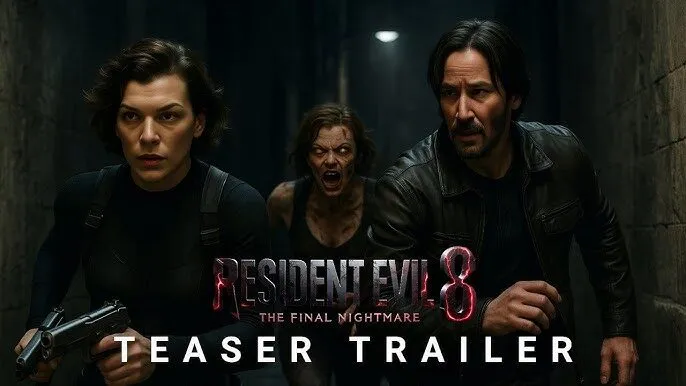The long-running Resident Evil franchise has finally reached its cinematic climax with Resident Evil 8: The Final Nightmare, and it’s safe to say that this entry attempts to go out with a bang. From the opening sequence, where chaos erupts in a ruined European city under siege by mutated hordes, the film wastes no time in setting a relentless pace. Unlike some of its predecessors, which often fell into uneven storytelling, this installment feels more focused, combining action, horror, and emotional stakes in a surprisingly cohesive way. Fans of the games will notice countless nods—from iconic weapons to familiar locations—that serve as a nostalgic treat without derailing the plot for newcomers.

One of the biggest strengths of The Final Nightmare lies in its atmosphere. Director Marcus Hall—taking over the reins for this concluding chapter—has crafted a hauntingly beautiful world. The dilapidated castles, underground labs, and foggy forests are drenched in moody lighting that amplifies the sense of dread. The cinematography leans heavily into horror aesthetics, often allowing silence and shadows to build suspense before unleashing frantic action. This balance of quiet tension and explosive set pieces works far better than in earlier sequels, where nonstop action often overshadowed the horror roots. Here, the terror feels more intimate and psychological, even as massive battles rage in the background.

Performance-wise, the cast elevates the film beyond just spectacle. The returning lead, Alice (Milla Jovovich), portrays her character with a weariness that reflects years of trauma, but also with a determination that makes her final stand gripping to watch. The new antagonist, portrayed by Javier Bardem, delivers a chilling performance as a morally twisted scientist obsessed with reshaping humanity through viral mutation. The dynamic between hero and villain feels more layered this time, adding philosophical weight to the chaos. Supporting characters are also given more depth, especially Claire and Leon, who finally get substantial arcs rather than being sidelined as mere allies.

Of course, the film isn’t flawless. Some of the CGI-heavy sequences feel overly cartoonish, particularly in the climactic third act where swarms of creatures fill the screen. While the visual effects are ambitious, they occasionally break immersion. The pacing also struggles in the middle section, dragging slightly as the plot juggles multiple subplots. Longtime fans might also find certain story resolutions rushed, with a few character fates wrapped up too neatly. That said, these shortcomings never derail the overall experience; they simply highlight the challenge of closing such a sprawling franchise.

Ultimately, Resident Evil 8: The Final Nightmare succeeds as both a satisfying conclusion and a love letter to its fans. It may not reinvent the genre, but it delivers what audiences have come to expect: terrifying monsters, heart-pounding action, and just enough humanity to keep us invested. It’s rare for a franchise of this length to end on a note that feels both climactic and respectful to its legacy, yet this film manages to strike that balance. For fans who have followed the series from the beginning, it’s a fitting farewell—one last bloody nightmare worth witnessing on the big screen.